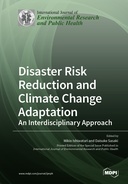Explore

Disaster Risk Reduction and Climate Change Adaptation:
0 Ungluers have
Faved this Work
Login to Fave
A multidisciplinary approach that involves multiple sectors and stakeholders is essential for disaster risk reduction and adaptation to climate change. This Special Issue explores how interdisciplinary approaches could resolve a wide range of issues, including risk and damage assessment, behavior change, investment, and evidence-based policy formulation.
This book is included in DOAB.
Why read this book? Have your say.
You must be logged in to comment.
Rights Information
Are you the author or publisher of this work? If so, you can claim it as yours by registering as an Unglue.it rights holder.Downloads
This work has been downloaded 113 times via unglue.it ebook links.
- 113 - pdf (CC BY) at Unglue.it.
Keywords
- abrupt
- adaptation
- Agent-based modeling
- agricultural drought vulnerability
- agricultural production
- agricultural productive services
- AHP
- cereal production
- China
- Cilegon
- Climate Change
- climatic suitability zoning
- coastal areas
- Community
- community-based adaptation
- compound indicator
- Conflict
- contribution model
- COVID-19
- digital disaster reduction
- disaster assessment
- disaster preparedness capability
- disaster prevention and mitigation capacity
- disaster risk
- disaster risk perception
- Disaster Risk Reduction
- disaster science
- earthquake disaster
- earthquake emergency response
- earthquake fatalities
- earthquake relief
- Electricity, electromagnetism & magnetism
- empirical method
- entropy weight method
- evacuation
- evaluation index system
- evidence-based policymaking
- excess mortality
- exposure
- extreme temperature indices
- Family
- financing mechanism
- flood protection
- food aid
- green infrastructure
- hazard
- heavy rainstorm
- high-temperature disaster
- household survey
- humanitarian aid
- indirect death
- Indonesia
- investment cycle
- investment in DRR
- Jakarta
- Japan
- kiwifruit
- Local government
- long-term effects
- long-term plan
- lost decades
- Mathematics & science
- Method
- multi-variate Probit model
- n/a
- Natural disasters
- natural hazard-triggered technological (Natech)
- nature-based solutions
- Numerical Simulation
- Official development assistance
- ordinal logistic regression
- Perception
- Physics
- Poisson regression model
- Poverty
- prediction
- principal component analysis
- protective actions
- rapid estimation
- Reference, information & interdisciplinary subjects
- Research & information: general
- Risk assessment
- risk perception
- Sendai Framework for Disaster Risk Reduction
- single-person households
- spatial heterogeneity
- surveillance system
- the population at risk
- vulnerability
- Yangbi earthquake
- Yangtze River Basin
Links
DOI: 10.3390/books978-3-0365-6687-0Editions

